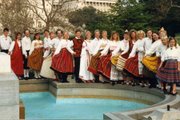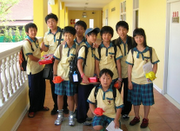
Dear all,
The China Ninth FLTRP Cup National Debating Competition involved a steep learning curve which left many participants puffing with exhaustion and indignation. However, for those who had the stamina, forbearance and dedication, the competition provided much insight into the rudiments of Parliamentary Style debating as well as the opportunity to practice.
There were some cracking good debates about topics including Compulsory Retirement Age, Effects of Tourism, Road Congestion, Moral Education of Students and Further Education of Olympic Athletes. Competitors showed amazingly wonderful control of language and delivery, thoughtful analyses, considerable courage and graciousness in defeat. It is to be hoped that they will feel the week to have been beneficial in very many ways despite the hard work involved.
The introduction of anything new will always be accompanied by some bewilderment and questioning but in the case of Parliamentary Style debating, the difficulties are many. The style is relatively new in China and the rules are both difficult to explain and to apply.
Firstly, the training provided on the first day was extremely helpful, although it may have been better if more time had been given to allow for open questioning. People had to get the rules and guidelines clear and this did not happen as well as it might despite the best efforts of the trainers. However, there was plenty of time throughout the week to clarify aspects and it was good to see participants asking questions and ‘debating the rules of debating’ over lunches and dinners. It was extremely heartening to find that teams had started to win having lost their first few rounds after gaining greater insight from a conversation with a judge or trainer.
Sometimes this insight came too late for the team to make it into the last 16, but it is to be hoped that students and coaches will return to their universities with the zeal to pass on their knowledge. By doing so, next year’s participants will start at a higher level and progress to greater heights. The organizers had made it clear that this year’s competition provided an opportunity to learn as well as to compete.
Secondly, there is a high level of subjectivity in the judgment of any speaking competition. People hear differently and focus on different aspects of what is being said. Where what is being said is an argument that is being delivered in order to persuade the judges and audience to a specific point of view, the room for misunderstanding or mishearing is greater.
Added to this the element of challenge and the fact that everyone is speaking in a second language, it is not surprising that there were times when the debaters thought they had clarified points that the judges failed to grasp. This is why any debate requires a minimum of 3 judges. However, to sit in judgment on others does require a high degree of diligence and preparation. The complaints were usually to do with judges not being sufficiently aware or consistent. Taking extensive notes of all points made will help judges to keep up with the side’s arguments and to remember what has been said. It is not possible to judge a debate by sitting back and just enjoying the speeches.
It is the duty of a judge to give a helpful evaluation. This means identifying the strong points as well as the weak points and saying how the weak points could be improved upon. Judges who put their egoism before their help are not doing their duty. At this stage in the evolution of debating, especially Parliamentary Style debating, effective evaluations are extremely important. Unfortunately, because of the lack of experienced judges, it was sometimes a case of the blind leading the blind!
Many may wonder what all the fuss is about and whether Parliamentary Style debating is worth learning. The proof came in the final rounds when the style reverted to traditional debating with 4 minute introductory and final speeches and 30 minutes of free argumentation. In both semi-finals and the grand final, although the teams provided a lively and humorous exchange, the arguments were superficial and static. There was little development because 12 minutes during free argumentation is not long enough to develop a complex idea. The lack of challenge and development meant that teams got stuck in a ping pong match of questions and answers which neither deepened nor furthered their arguments.
Dialectical debating, introduced by Socrates in the 5th Century BC, is the exploration of the truth of opinions through logical discussion of an argument. The argument is a set of reasons given in support of, or against, the motion and it is the exchange of these reasons that is going on in debate. Of course, in competition, there will be winners and losers but it is important to remember that the losers have provided a valuable role by challenging and picking holes in the oppositions arguments in order to test the worth of the policy being proposed. This is what underpins Parliamentary Style debating. The result of this is to deepen and extend arguments in order to solve the problem that is the basis of the motion in the best possible way. Therefore, it is clear that debating in this style is a useful skill to learn and practice.
Being an effective debater will help students both academically and in their business and personal lives. It encourages people to keep up with current affairs and to understand the issues. It develops awareness of other opinions, improves self-confidence and social communication skills. It also helps to create new ideas and best solutions and ensures all ideas are reasonable. Debate helps people to prepare for life as well for debate.
The 9th competition was different from that of previous years in that there had been no regional finals. 109 teams came to Daxing, on the outskirts of Beijing, so that as many as possible could benefit from the training provided. Whilst this caused some difficulty for teachers/coaches who were required to judge and therefore could not hear their teams perform, it did offer a great learning opportunity that should be appreciated. The competition was very well organized with excellent facilities allowing for some relaxation and clear information of what to do and where to do it. All comments and grievances were welcomed and every opportunity was given for people to improve their skills. The organizers should be applauded for their efforts and given credit for an educational, interesting and enjoyable competition.
Regards,
Rashedul Hasan Stalin
Source:http://stevenlichen.com/2007/05/01/an-educational-enjoyable-and-interesting-debating-competition/














No comments:
Post a Comment